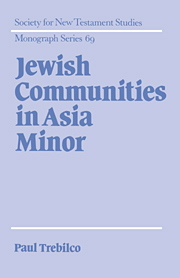Book contents
- Frontmatter
- Contents
- Preface
- List of abbreviations
- Map of Asia Minor
- Introduction
- 1 Jewish communities of Asia Minor in literary sources
- 2 The Jewish communities at Sardis and Priene
- 3 The Jewish community at Acmonia
- 4 The Jewish community at Apamea
- 5 The prominence of women in Asia Minor
- 6 Theos Hypsistos and Sabazios – syncretism in Judaism in Asia Minor?
- 7 ‘God-worshippers’ in Asia Minor
- 8 Jewish community and Greek city in Asia Minor
- Conclusions
- Notes
- References
- Indices
8 - Jewish community and Greek city in Asia Minor
Published online by Cambridge University Press: 21 October 2009
- Frontmatter
- Contents
- Preface
- List of abbreviations
- Map of Asia Minor
- Introduction
- 1 Jewish communities of Asia Minor in literary sources
- 2 The Jewish communities at Sardis and Priene
- 3 The Jewish community at Acmonia
- 4 The Jewish community at Apamea
- 5 The prominence of women in Asia Minor
- 6 Theos Hypsistos and Sabazios – syncretism in Judaism in Asia Minor?
- 7 ‘God-worshippers’ in Asia Minor
- 8 Jewish community and Greek city in Asia Minor
- Conclusions
- Notes
- References
- Indices
Summary
In this chapter I will examine the relationship between Jewish communities in Asia Minor and the cities in which they lived. I will discuss the evidence concerning Jews being citizens of their city or Roman citizens and for Jews being actively involved in different facets of the life of their city.
The constitutional position of Jewish communities in Asia Minor
The investigation of the civic rights of the Jewish communities in the Diaspora in general and in Asia Minor in particular is difficult and much debated. Owing to differences in the foundation and development of the various Diaspora communities, the position of the Jews outside Asia Minor does not help us in the examination of the civic position of Jews in Asia Minor itself. Thus, other evidence will be discussed only as it is relevant to Asia Minor.
In Ant 12:119 Josephus states that Seleucus Nicator (d. 280 BCE) granted the Jews citizenship (πολιτεία) in the cities he founded in Asia, Lower Syria and Antioch and gave them equal privileges (ἰσοτίμος) with the Macedonian and Greek settlers. They still possessed this citizenship in Josephus' own day. Similarly, in CAp 2:39 Josephus claims that:
Our Jewish residents in Antioch (οἱ τὴν Ἀντιóχειαν ΚατοιΚοῦντες) are called Antiochenes, having been granted rights of citizenship (πολιτείαν) by its founder, Seleucus. Similarly, those at Ephesus and throughout the rest of Ionia bear the same name as the indigenous citizens (τοῖς αὐιγενέσι πολίταις ὁμωνυμοῦσιν), a right which they received from the Diadochi.
- Type
- Chapter
- Information
- Jewish Communities in Asia Minor , pp. 167 - 185Publisher: Cambridge University PressPrint publication year: 1991



